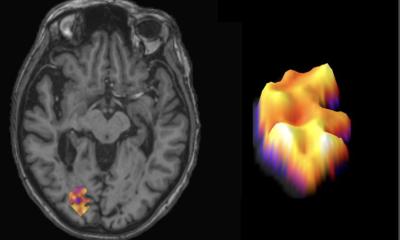
Image source: Adobe Stock/Rasi
News • Role of EBV in MS progression
New study explains how Epstein-Barr virus causes multiple sclerosis
Researchers at Karolinska Institutet have found further evidence for how the Epstein-Barr virus can trigger multiple sclerosis or drive disease progression.
A study published in Science Advances shows that some individuals have antibodies against the virus that mistakenly attack a protein in the brain and spinal cord.
The Epstein-Barr virus (EBV) infects most people early in life and then remains in the body, usually without causing symptoms. The link between EBV and the neurological disease multiple sclerosis (MS) was discovered many years ago and has puzzled researchers ever since. Increasing evidence, including two papers published in Science and Nature last year, suggests that EBV infection precedes MS and that antibodies against the virus may be involved. However, the molecular mechanisms seem to vary between patients and remain largely unknown.

Image source: Karolinska Institutet; photo: Erik Holmgren
“MS is an incredibly complex disease, but our study provides an important piece in the puzzle and could explain why some people develop the disease,” says Olivia Thomas, postdoctoral researcher at the Department of Clinical Neuroscience, Karolinska Institutet and shared first author of the paper. “We have discovered that certain antibodies against the Epstein-Barr virus, which would normally fight the infection, can mistakenly target the brain and spinal cord and cause damage.”
The researchers analysed blood samples from more than 700 patients with MS and 700 healthy individuals. They found that antibodies that bind to a certain protein in the Epstein-Barr virus, EBNA1, can also bind to a similar protein in the brain and spinal cord called CRYAB, whose role is to prevent protein aggregation during conditions of cellular stress such as inflammation. These misdirected, cross-reactive antibodies may damage the nervous system and cause severe symptoms in MS patients, including problems with balance, mobility and fatigue. The antibodies were present in about 23 percent of MS patients and 7 percent of control individuals.
“This shows that, whilst these antibody responses are not required for disease development, they may be involved in disease in up to a quarter of MS patients,” says Olivia Thomas. “This also demonstrates the high variation between patients, highlighting the need for personalised therapies. Current therapies are effective at reducing relapses in MS but unfortunately, none can prevent disease progression.”

Image source: Karolinska Institutet; photo: Erik Holmgren
The researchers also found that there is likely a similar cross-reactivity among T cells of the immune system. “We are now expanding our research to investigate how T cells fight EBV infection and how these immune cells may damage the nervous system in multiple sclerosis and contribute to disease progression,” says Mattias Bronge, affiliated researcher at the Department of Clinical Neuroscience, Karolinska Institutet and shared first author of the paper.
The study was financed by Sweden’s innovation agency Vinnova, the Swedish Research Council, the Swedish Brain Foundation, Karolinska Institutet, MS Forskningsfonden, Neuro, and Region Stockholm. Co-author Hans Grönlund is the inventor of a current patent filed by NEOGAP Therapeutics AB and is the founder and co-owner of this company. Birce Akpinar, Ola B. Nilsson, Erik Holmgren and Guro Gafvelin hold positions at NEOGAP Therapeutics AB. Roland Martin is a co-founder, co-owner and an employee of Cellerys, a spin-out from the University of Zürich, and is a coinventor and patent holder for several patents. Roland Martin and Tomas Olsson have received grants and fees from several companies.
Source: Karolinska Institutet
20.05.2023











